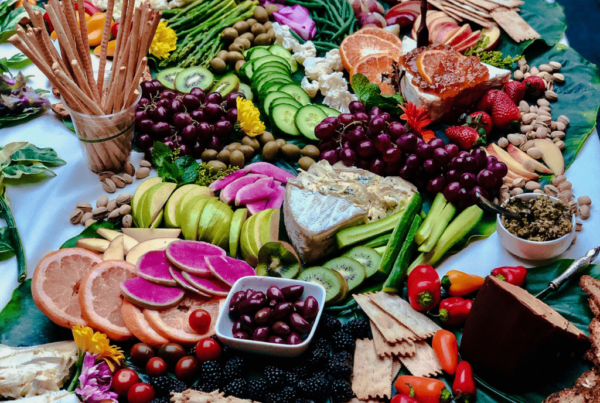Prenatal Nutrition: What Should Pregnant Mamas Eat?
Pregnancy is a transformative time, both physically and nutritionally. Every cell formed in an unborn child depends on the mother’s body for nourishment. But what happens when a mother struggles to eat the foods she planned?
As a chef and nutritionist, I thought I would thrive on a diet of wild fish, organ meats, and leafy greens. Instead, I spent 33 weeks throwing up, unable to keep down many of the nutrient-dense foods I had planned. Studying prenatal nutrition was one thing—experiencing pregnancy was another.
This guide explores the science behind prenatal nutrition, historical pregnancy diets, and practical solutions for both expecting mothers and private chefs caring for them. Because, speaking from personal experience, what we learn about prenatal nutrition in textbooks doesn’t always translate to real life.
Why Is Prenatal Nutrition Important?
During pregnancy, the body undergoes profound physiological changes. Nutrient needs increase, and a mother’s diet directly impacts fetal development. Beyond birth, the emerging field of epigenetics shows that a mother’s diet may alter her baby’s DNA and influence future generations.
For example:
-
- Studies of malnourished German women during WWII found that their grandchildren suffered from developmental disorders, suggesting long-term genetic effects of prenatal nutrition.
- In Fiji, islanders traditionally sought out lobster crabs before conception, believing them to produce healthier babies.
- The Maasai people of East Africa required couples to consume dense, nutrient-rich milk from lush pastures before marriage to ensure fertility and strong offspring.
Historically, cultures prioritized pregnancy nutrition long before prenatal vitamins existed. Today, many modern diets lack essential nutrients, making intentional eating more important than ever.
What Are the Most Important Nutrients During Pregnancy?
Many women struggle to meet basic nutrient requirements, especially when dealing with morning sickness, aversions, or limited food access. Here’s a breakdown of the most crucial prenatal nutrients, their traditional sources, and how to get them when eating is difficult.
What Foods Are High in Folate for Pregnancy?
Folate (vitamin B9) is critical for cell division and neural tube development. A deficiency can lead to birth defects and developmental issues.
Traditional sources of folate:
- Indigenous diets often emphasized organ meats like liver, which contain concentrated amounts of folate.
Many cultures relied on wild greens, legumes, and seafood to support fertility.
Modern solutions:
- Leafy greens (spinach, romaine, collards)
- Lentils, asparagus, avocado
- Folate supplements (for those who cannot tolerate folate-rich foods)
What worked for me: I couldn’t keep down standard prenatal vitamins, so I took folate pills separately and blended small amounts of spinach into smoothies.
For private chefs: Hide leafy greens in soups, sauces, or smoothies for clients struggling with aversions.
Why Is Iron Important During Pregnancy?
Iron needs increase by 50% during pregnancy to support fetal growth and maternal blood volume.
Traditional sources of iron:
- Many ancestral cultures prized liver and red meat for fertility and pregnancy.
- Coastal communities relied on clams, mussels, and fish for bioavailable iron.
Modern solutions:
- Red meat, poultry, and seafood
- Lentils, spinach, pumpkin seeds (plant-based, less absorbable)
- Iron supplements (gummies or liquid for easier digestion)
What worked for me: I couldn’t stomach red meat for months, so I took iron gummies and paired small amounts of beef with vitamin C-rich foods.
For private chefs: Offer slow-cooked meats or liver pâté in small portions to make iron easier to tolerate.
How Do Omega-3s Support Fetal Development?
DHA and EPA, two forms of omega-3s, support brain and eye development in the baby.
Traditional sources of omega-3s:
- Coastal and island cultures prioritized seafood, including sardines, salmon, and shellfish.
- Many indigenous groups consumed fermented fish eggs for pregnancy nutrition.
Modern solutions:
- Wild-caught salmon, sardines, and anchovies
- Pasture-raised eggs
- Omega-3 supplements (especially if fish is unappealing)
What worked for me: I couldn’t eat fish at all (except for craving poke…), so I relied on DHA-rich supplements and chia seeds blended into smoothies.
For private chefs: If seafood is unappealing, focus on omega-3-rich eggs and grass-fed dairy.
How to Stay Hydrated During Pregnancy
Many pregnant women struggle with dehydration, especially when dealing with nausea or vomiting.
Traditional hydration methods:
- In tropical climates, pregnant women drank fresh coconut water for hydration and electrolytes.
- Many cultures relied on herbal teas to soothe digestion.
Modern solutions:
- Coconut water (natural electrolytes)
- Herbal teas (ginger, peppermint, or raspberry leaf in later pregnancy)
- Infused water with citrus or cucumber
What worked for me: I couldn’t keep down plain water but found coconut water to be a lifesaver.
For private chefs: Offer hydrating foods like watermelon, broth-based soups, and electrolyte-rich drinks.
What to Eat When You Can’t Eat?
For mothers experiencing extreme nausea, eating often becomes about survival rather than perfect nutrition.
Traditional pregnancy staples across cultures:
- Many societies relied on simple, easy-to-digest starches like plantains, rice, or yams.
- Fermented foods, such as miso and yogurt, were common for gut support.
Modern solutions:
- Smoothies with coconut water, banana, and collagen
- Plain starches like sourdough toast or rice
- Broth-based soups with gentle proteins
What worked for me: Some days, toast and coconut water were all I could keep down. When I felt stronger, I relied on smoothies for nutrients.
For private chefs: Offer nutrient-dense smoothies and mild, broth-based meals to nourish without overwhelming digestion.
Final Personal Thoughts from a Chef Mama: Trusting Your Body, Your Intuition, and Letting Go of Guilt
If there’s one thing I wish I could tell my pregnant, constantly nauseous, nutrient-obsessed self, it’s this: you are not failing.
Pregnancy nutrition is important, but so is trusting your body and your intuition. I spent so much time worrying that I wasn’t eating enough liver, enough wild fish, enough perfectly balanced meals—and yet, despite all of that, my body did exactly what it was designed to do.
Even without my dream pregnancy diet, expensive prenatals, or organ meats, and despite the “geriatric pregnancy” label slapped onto my medical chart, my daughter was born healthy, strong, and is still thriving to this day.
Looking back, I wish I had given myself more grace and mental peace between puke sessions. I wish I had trusted that my body would give everything it had to protect and nourish the life growing inside me. Because that’s what pregnant bodies do. They pull nutrients from deep reserves, shift priorities, and adapt in ways we don’t even fully understand.
For any other mothers out there feeling guilty about not eating perfectly, please hear me: your body knows what it’s doing. Some days, the best you can do is keep down a smoothie or a piece of toast. And that is enough.
And for the private chefs and caretakers supporting expecting mothers—your role is powerful. Every small adjustment you make, every gentle, nourishing meal you offer, helps a mother feel more supported and less alone in this process.
And don’t even get me started on trying to cook professionally while pregnant—that’s a whole other blog post…

Kyra Bramble, the founder of More Pleaze, is a private chef and educator who has redefined the culinary experience by focusing on food as a means of storytelling, sharing, and healing. Her journey began with a deep passion for creating intentional, locally sourced cuisine that nourishes both body and soul. With extensive experience in retreat catering and a holistic approach to food, Kyra has built a vibrant community of chefs through More Pleaze, celebrating the joy of exceptional dining. Kyra is also the head chef at Lotus Chefs available for select coaching and consultations along with chef-specific digital downloads at her personal website, offering her expertise to private chefs who want to deepen their craft and navigate the business side of their culinary journey.





